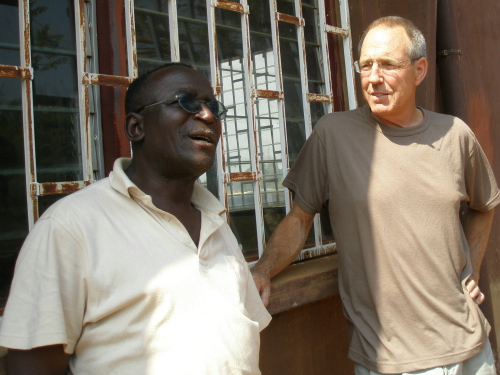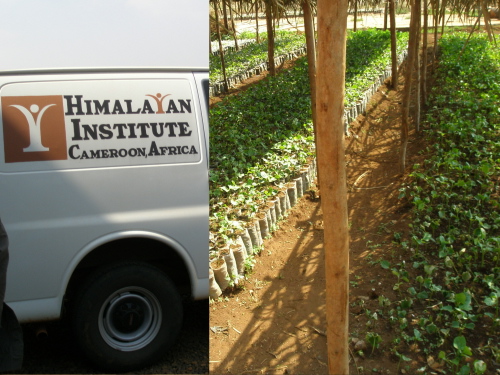1 Feb 2008
The Himalayan Institute makes a long journey from India through the U.S to Kumbo in Cameroon.
In India, the Himalayan Institute means different things to different people. For over three decades it has been involved in supporting humanitarian projects, in promoting meditation and Yoga, in the vocational training of artisans and most importantly in promoting biofuel development. The Institute opened a branch in the U.S and it is the U.S- based Himalayan Institute that has opened a project in Kumbo, Cameroon.
When I visited their new office in Kumbo in late December 2007, it was obvious that it was a project at its infancy. The office opened a couple of months back in Kumbo (a town in Bui Division) that is about two and a half hours of bumpy drive from Bamenda.
It was a non working day but one of the American Trainers at the Institute Marten Nyar was kind enough to receive us. He told us that for the moment, the Institute was currently training a couple of people in the production of jewelry and he was in Cameroon to set up the Carpentry machinery section. “I was asked to come here to introduce power working tools into the carpentry business”. Said Nyar. "It's a marvelous opportunity for me just as a human being to have the creative opportunity and then come in into such a fertile environment in terms of people that have so much integrity and so much skills in what they are doing with hand tools". He added. Nyar apologized that the person that could have briefed us on the biofuel project was absent but nonetheless he went ahead to explain the concept to us. "The idea is to put in a model farm that will grow things that are of economic benefit like castor and most importantly (this is what I am apologizing, I am little weak on this) and the pongamia-which is the tree that they will be able to make biofuels".
"The thrust of the overall vision for the Himalayan Institute is to get large plantations" consisting of a "band of biofuel plantations that criss cross Africa". We could see a small nursery of castor, artemesia and other plants behind the office building.

Marten Nyar (right) chatting with a U.S embassy staff Fai Visha
Biofuel has become a very hot topic in the light of global climate change largely attributed to the burning of fossil fuels. Currently an increasing number of new cars run on alcohol produced from sugarcane, corn and other cereals. Countries like the US support the use of alcohol that is considered ‘cleaner’ fuel than petrol while Cuba is emerging as the leading opponent of biofuel use on grounds that it will take food away from the mouths of the poor to satisfy car users. The pongamia (a non food crop) project is being promoted as an alternative to satisfy both sides of the energy debate.
Marten Nyar continued; "[The Spiritual Head of the HI] has visited Nigeria and two or three other African countries in the last couple of years introducing the concept and it turned out that Cameroon on the one hand and Kumbo in particular were those places that were the most receptive and that is why we are here"
Nyar told us that from their findings, the pongamia tree which they are about to import into Cameroon belongs to the same family with a similar tree growing in the wild in the country. This, according to him should allay any fears that the HI is about to import alien trees that are not compatible with the local environment.

Nursery at Himalayan Institute, Kumbo.
According to him, the advantage of the pongamia tree is that “it can be grown on less-than-ideal crop land” and as such it does not displace land for food production as it can be grown on the Savannah hills of Kumbo area.
Different parts of the tree have many uses but the seeds are the ones that are used to produce oil that can be employed as biofuel.
On the face value, the idea of creating large plantations of the shady pongamia looks very attractive. Among the unanswered questions is whether the peasants that will eventually work on the pongamia plantations will not suffer the same fate like their predecessors that toiled on coffee plantations in the same area. It should be recalled that when world coffee prices (a cash crop) collapsed about three decades ago, thousands of Cameroon farmers went into penury. That was the price they had to pay for investing heavily on a product that they did not themselves consume it.
In a country like Cameroon where unemployment is rife, any project like this will certainly be received with open hands.
See image of the pongamia tree at this link
http://gislab.fiu.edu/treesofmiami/trees/sp_pages/Pongamia_pinnata.html
Njei Moses Timah
|